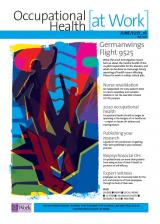June/July 2016 (vol. 13/1)
ContentsFeaturesNewsLegal
NewsResearch DigestResearch PlusCPD
Research Plus
Psychosocial factors predict early retirement
Job satisfaction and good psychosocial working conditions are significant predictors of delaying retirement, this Danish population study found. Employees aged 56 to 64 in 2008 were followed up over four years – 1,000 workers (53% of the sample) retired during that period. After controlling for ill health and other confounders, 10 psychosocial factors were significantly predictive of taking early retirement (ie retiring between the ages of 60 and the ‘official’ retirement age of 65). These included low job satisfaction (HR = 3.33; CI–2.4–4.7; p < 0.0001); lack of possibilities for development (HR = 2.04; CI 1.4–3.0; p = 0.0002); low recognition by management (HR = 1.87; CI 1.4–2.5; p < 0.0001) and perceived age discrimination (HR = 1.8; CI 1.3–2.5; p = 0.0003). Work pace, quantitative demands, emotional demands, role conflicts, social community between colleagues, and trust between colleagues did not predict early retirement.
Occupational Health at Work June/July 2016 (vol. 13/1) pp41



